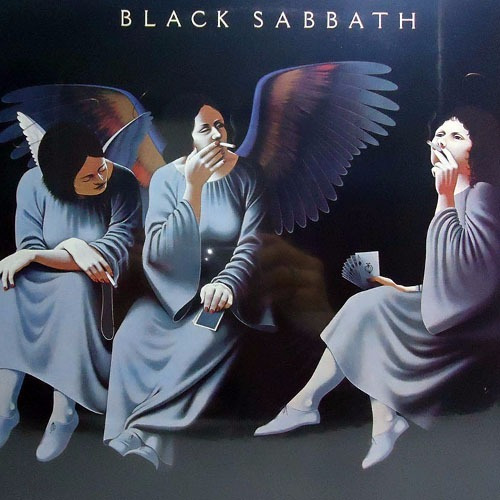

2 Nichols moved over to keyboards, which also play an effective role on the album, and Black Sabbath were back off to the races. And when Geezer heard some demos (bass parts had been performed and often written by Geoff Nichols, including the excellent title track) he rejoined the band for recording. A side project with former Rainbow/ Elf singer Ronnie James Dio was perhaps a better idea, but as the pair jammed it became apparent this was new Black Sabbath material. Ozzy got canned, Geezer Butler went back home to tend to marital issues, and Tony Iommi wasn’t even sure a Black Sabbath album was in the cards. The band had toiled for nearly a year on the album, with nothing to show for it. Nobody expected Heaven and Hell to be a landmark album, not even Black Sabbath.

1 And what came next was actually, subjectively, unemotionally, one of the band’s finest moments. No matter what came next, it was a low bar. I want good albums period, and let’s be honest, this record’s predecessor was Never Say Die!, undoubtedly one of the band’s least finest moments, with or without their infamous leading man.

Being a human completely lacking in emotion or empathy, I don’t care about it. Passions are inflamed and regrettable words are spewed in both directions any time this debate comes up. It would be the first of just a few records to include Dio, but his involvement breathed new life into the band and resulted in what would be one of their best Ozzy-free albums.Hello, controversy! In all of metal, one of the most controversial topics is Black Sabbath with and without Ozzy. Upon its release, Heaven and Hell was one of Black Sabbath's more commercially successful albums, bringing the group into the '80s with a renewed spirit and a coat of production polish that saved them from the brink of demise they'd been teetering on. Dabbling with synthesizers on "Die Young" and the cinematic ending of "Lonely Is the Word" met with anthemic rock riffing on "Walk Away," all of which successfully expanded the band's range in ways that had flopped on their late-'70s albums. "Children of the Sea" is a moody and wandering number that continues the classically informed songwriting that came in and out of focus on various earlier Sabbath tracks, and the epic title track builds to a full-boil rocker before winding down to an outro of eerie classical guitar as the dust settles. The chugging riffing of opener "Neon Knights" taps into the forward motion of "Paranoid," but replaces the confusion and depravity of that unhappy anthem with excited, fantastical lyrics and Dio's dynamic vocals. In many ways, Heaven and Hell found a Sabbath that was almost unrecognizable from the form they began in just over a decade earlier, but echoes of their past connected with a sense of rejuvenation for some of their strongest material since 1973's Sabbath Bloody Sabbath. The stylistic shift from heaviness to more intricate hard rock that had floundered on Osbourne-led albums like Never Say Die seemed perfectly fitted for Dio's driving vocals, with tracks like the high-tempo "Wishing Well" pushed forward by his soaring self-harmonizing and Geezer Butler's distinctive bass playing rolling strongly along. Rainbow vocalist Ronnie James Dio stepped in, transforming the group's sound completely by replacing Osbourne's idiosyncratic evil whine with a vocal style that was both more theatrical and technically controlled. After straying from the sludgy intensity of their early records for a string of increasingly experimental and commercially underperforming releases, original vocalist Ozzy Osbourne left the band during the first round of recording sessions for ninth album Heaven and Hell. By the end of the '70s, drug abuse and interpersonal turmoil had completely unraveled Black Sabbath.


 0 kommentar(er)
0 kommentar(er)
